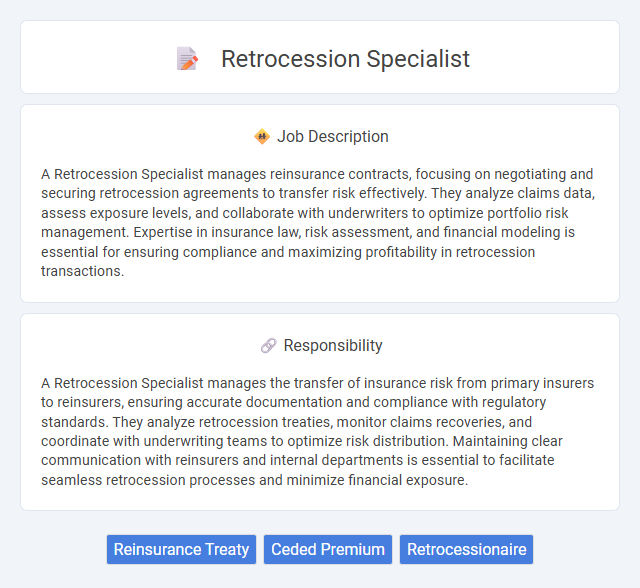
A Retrocession Specialist manages reinsurance contracts, focusing on negotiating and securing retrocession agreements to transfer risk effectively. They analyze claims data, assess exposure levels, and collaborate with underwriters to optimize portfolio risk management. Expertise in insurance law, risk assessment, and financial modeling is essential for ensuring compliance and maximizing profitability in retrocession transactions.
Individuals with strong analytical skills and attention to detail are likely to find a career as a Retrocession Specialist suitable due to the complexity of reinsurance contracts they handle. Those comfortable working with data and financial risk assessments may have a higher probability of thriving in this role. People who prefer structured environments and enjoy negotiating terms between insurers and reinsurers are probably well-suited for this position.
Qualification
A Retrocession Specialist requires in-depth knowledge of insurance and reinsurance principles, risk assessment, and claims management, supported by a degree in finance, risk management, or related fields. Proficiency in data analysis, contract negotiation, and regulatory compliance ensures the effective management of retrocession agreements. Strong communication skills and experience with industry software tools, such as reinsurance tracking systems, are essential for optimizing portfolio risk transfer.
Responsibility
A Retrocession Specialist manages the transfer of insurance risk from primary insurers to reinsurers, ensuring accurate documentation and compliance with regulatory standards. They analyze retrocession treaties, monitor claims recoveries, and coordinate with underwriting teams to optimize risk distribution. Maintaining clear communication with reinsurers and internal departments is essential to facilitate seamless retrocession processes and minimize financial exposure.
Benefit
A Retrocession Specialist is likely to enjoy benefits such as enhanced risk management skills and a deeper understanding of reinsurance processes. The role may offer financial incentives through commission or performance-based bonuses, increasing overall compensation. There is also a probable opportunity for career advancement within the insurance and reinsurance sectors due to specialized expertise.
Challenge
The role of a Retrocession Specialist likely involves managing complex risk transfer agreements, requiring deep understanding of reinsurance contracts and market conditions. Navigating fluctuating insurance markets and ensuring accurate data analysis may present ongoing challenges that demand high attention to detail and adaptability. Mastery in negotiating terms and maintaining strong relationships with reinsurers is probably essential for success in this position.
Career Advancement
A Retrocession Specialist manages the transfer of insurance risk between reinsurance companies to optimize risk portfolios and capital efficiency. Mastery of complex risk assessment and negotiation skills enables career advancement into senior risk management or strategic underwriting roles. Proficiency in data analytics and industry regulations enhances opportunities for leadership positions within reinsurance firms.
Key Terms
Reinsurance Treaty
A Retrocession Specialist manages the process of transferring portions of reinsurance risk from one reinsurer to another through retrocession treaties, ensuring optimized risk distribution and capital efficiency. Expertise in analyzing reinsurance treaty terms, negotiating retrocession agreements, and monitoring portfolio performance is essential for mitigating potential losses and maintaining regulatory compliance. Proficiency in industry software and strong communication skills enable effective collaboration with underwriting, claims, and actuarial teams.
Ceded Premium
A Retrocession Specialist manages ceded premium processes by analyzing and negotiating contracts that transfer risk from insurers to reinsurers. They ensure accurate calculation, timely reporting, and compliance of ceded premiums to optimize risk distribution and financial stability. Expertise in premium reconciliation, risk assessment, and regulatory requirements is critical for effective retrocession management.
Retrocessionaire
A Retrocession Specialist manages complex risk transfer agreements between insurance companies and retrocessionaires, ensuring accurate pricing and risk assessment to safeguard financial stability. They analyze retrocession contracts, monitor claims, and coordinate with the retrocessionaire to optimize portfolio performance and minimize exposure. Expertise in underwriting, reinsurance treaties, and regulatory compliance is essential for effective retrocession management.
 kuljobs.com
kuljobs.com